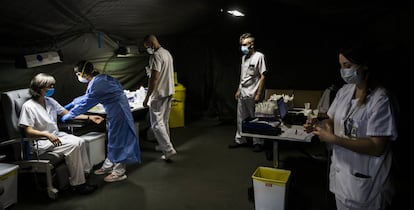Daily coronavirus-related deaths in Spain fall to 138, but new cases continue to rise
For the first time since March 19, five of the country’s 17 regions recorded no Covid-19 fatalities

The number of daily coronavirus-related deaths fell to 138 on Friday, according to the latest figures from the Spanish Health Ministry. This is a drop from Thursday, when 217 victims were recorded, and the second-lowest figure recorded since the beginning of March. The number of daily coronavirus deaths was 184 on Wednesday, 176 on Tuesday, 123 on Monday, and 143 on Sunday.
For the first time since March 19, five of Spain’s 17 regions recorded no coronavirus-related deaths: the Balearic Islands, the Canary Islands, Galicia, Basque Country and La Rioja. In the past 24 hours, the regions of Aragón, Cantabria and Murcia each recorded just one fatality, while Navarre, Asturias and Extremadura each reported two.
The number of new coronavirus cases was 549 on Friday, the highest figure reported in a week
The total number of victims in Spain now stands at 27,459. This figure, however, continues to fall below the more than 30,000 deaths detected by the daily mortality monitoring system known as MoMo, which was created in 2004 to track the impact of heatwaves in Spain.
The number of new coronavirus cases, as confirmed by PCR tests, was 549 on Friday, the highest figure in a week. This brings the total number of infections since the beginning of the pandemic to 230,183. Catalonia recorded the highest number of new cases (151) and coronavirus-related deaths (59).
According to the latest figures, 346 coronavirus patients were admitted to hospital and 29 into intensive care (ICU) in the past 24 hours. Most of these cases were recorded in the Madrid region, which saw 95 hospitalizations and 10 ICU admissions. The large majority of Spain’s regions reported fewer than two ICU admissions.
Since Thursday, 1,409 patients have been discharged from hospital after recovering from the disease, bringing the total to 144,783.
France to introduce quarantine for travelers from Spain
France will impose a 14-day quarantine on travelers coming from Spain in response to the Spanish government’s decision to impose such a measure on all international visitors, an official at the French presidential palace said on Thursday.
“France will impose a 14-day quarantine from the moment Spain imposes the measure, based on the principal of reciprocity,” the presidential official said.
On Tuesday, the Spanish government announced that it would impose a quarantine on all visitors to the country, including French residents and other residents of the European Union, in a bid to control the coronavirus outbreak.
The French official did not give the precise date of the quarantine, saying this was still the subject of bilateral talks. In Spain, the quarantine measures came into effect on Friday, May 15, and will last for the duration of the state of alarm, which is set to end on May 24, if Congress does not approve another extension.
Coronavirus detection
The region of La Rioja has detected the highest number of coronavirus cases via PCR tests in Spain. That’s according to the preliminary results of an antibody study into the prevalence of Covid-19, which were announced on Wednesday.
The results showed that the northern region has detected 38% of positive cases – four times the average in Spain. Galicia came in second place with a 15.82% detection rate, followed by the Basque Country with 14.71%, and Navarre with 13.19%. These four regions were the site of significant coronavirus outbreaks, meaning more testing was required.
At the other end of the spectrum, Andalusia and the Canary Islands have only detected 5.51% and 5.99% of cases, respectively. These figures, however, do not reflect the great differences between the two regions. The Canary Islands has reported very few coronavirus cases, and two islands on the archipelago – Hierro and La Gomera – were among the first to move to Phase 1 of the government’s deescalation plan. The southern region of Andalusia, on the other hand, was only partially able to move to this stage, with the provinces of Málaga and Granada remaining in Phase 0.
Valencia to subsidize cost of bicycles
The regional government of Valencia will subsidize the purchase of bicycles and scooters by up to €250 in a bid to promote sustainable individual transport and stimulate small business, which has been hit hard by the coronavirus crisis. The measure, which was announced by premier of Valencia, Ximo Puig, on Thursday, is part of a broader plan to promote sustainable mobility as the coronavirus restrictions are eased.
The €500,000-plan is aimed at helping residents in the region to purchase traditional bicycles, electric bicycles, personal mobility devices (like electric scooters) and electric bicycle conversion kits from participating shops and establishments that are headquartered in Valencia. The subsidies will range from €75 for an electric scooter (which typically costs no more than €450) to €250 for an electric bike (which typically costs no more than €1,400).
Health Ministry changes criteria for mothers with Covid-19
The Spanish Health Ministry has updated its protocols regarding the treatment of mothers with Covid-19 and their newborn babies. The first version of the guidelines stipulated that newborn “should be isolated and separated from their mother.”

But in the new version, updated on Wednesday, the guide states that the “separation [of mothers and newborns] and avoiding skin on skin contact, kangaroo care [a method involving breastfeeding and skin-to-skin contact for low birth weight babies] does not appear to be recommended, especially in the moments immediately after birth.”
Under the new guides, a mother with coronavirus must only be separated from her baby if it is required due to the seriousness of her condition.
With reporting by Marcs Bassets, Lucía Abellán, Cecilia Jan, Oriol Güell, Emilio De Benito and Cristina Vázquez.
English version by Melissa Kitson.
Tu suscripción se está usando en otro dispositivo
¿Quieres añadir otro usuario a tu suscripción?
Si continúas leyendo en este dispositivo, no se podrá leer en el otro.
FlechaTu suscripción se está usando en otro dispositivo y solo puedes acceder a EL PAÍS desde un dispositivo a la vez.
Si quieres compartir tu cuenta, cambia tu suscripción a la modalidad Premium, así podrás añadir otro usuario. Cada uno accederá con su propia cuenta de email, lo que os permitirá personalizar vuestra experiencia en EL PAÍS.
¿Tienes una suscripción de empresa? Accede aquí para contratar más cuentas.
En el caso de no saber quién está usando tu cuenta, te recomendamos cambiar tu contraseña aquí.
Si decides continuar compartiendo tu cuenta, este mensaje se mostrará en tu dispositivo y en el de la otra persona que está usando tu cuenta de forma indefinida, afectando a tu experiencia de lectura. Puedes consultar aquí los términos y condiciones de la suscripción digital.









































